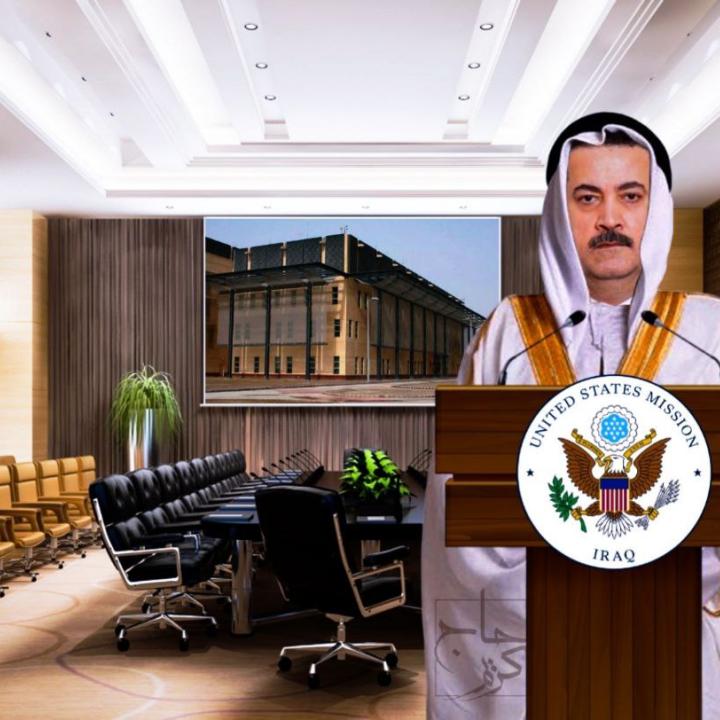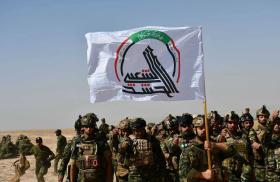
Nujaba Leads the "Big Three" Reaction to Iraq's Telegram Ban

While one leading militia spearheaded online vitriol against a social media ban that affected its affiliates, Asaib Ahl al-Haq and Kataib Hezbollah seemed more inclined to compromise.
The three top Iraqi militias who lead the muqawama (resistance) movement and the Coordination Framework (CF) coalition have all criticized the government's recent restrictions on the messaging app Telegram, but to varying degrees and with differing agendas. Harakat Hezbollah al-Nujaba seemed to respond most strongly, in part because its primary facade group may have been specifically targeted under the cover of a broader action. Yet reactions from Asaib Ahl al-Haq (AAH) and Kataib Hezbollah (KH) were more nuanced.
Nujaba's Reaction
In one particularly scathing critique, the chair of Nujaba's political council, Ali al-Asadi, implied that the government ban happened as a result of U.S. pressure.
He tweeted: “The invitation of the Iraqi military leaders to the Pentagon...under the auspices of the High Commissioner, Aunt Alina Romanowski, at a time when Telegram has been banned is a cause for suspicion and a step for handcuffing Iraq that is intended to continue the brunt of the occupation...Let the conspirators know that the free are aware of what is going on behind the closed doors. There will be a stance that shakes the ground under the feet of the traitors. The brave have the final say, and the endings they want will inevitably be achieved” (Figure 1).
Although various other muqawama channels cited U.S. pressure on the government as a factor, no official militia figure adopted Nujaba's narrative. Rather, Asadi’s critique echoed the narrative of Nujaba-affiliated facade group Ashab al-Kahf (AK), which in recent months has increased its threats against U.S. targets and organized a protest against the U.S. embassy in Baghdad. AK’s main Telegram channel and sister channels had been criticizing Prime Minister Mohammed Shia al-Sudani for his perceived inaction on "expelling the occupying forces" from Iraq. In return, the government apparently convinced Telegram to shut down AK’s main channel, possibly while trying to submerge this targeted action within the broader (perhaps temporary) blocking of Telegram as a whole.
Asaib Ahl al-Haq
AAH's leadership also criticized the move, albeit with less strong language. Sanad al-Hamdani, a high-ranking member and head of the group's media operations, tweeted, "The restriction on Telegram is wrong and needs to be revised. Telegram is the platform of supporters of the CF, the muqawama, and Sudani, because Facebook is blocking them” (Figure 2). AAH military spokesman Jawad al-Talibawi expressed his shock as well, describing the measure as “incomprehensible.”
Kataib Hezbollah
The same day the Telegram ban was announced, Saud al-Saedi, the head of KH’s Hoquq parliamentary bloc, addressed the minister of communications with four "parliamentary questions" about the decision. Question number 2 read, “What are the reasons behind shutting down the Telegram application, despite the great role that this platform plays in the field of media and the dissemination of targeted content?” (Figure 3).
A few days later, however, self-described KH security chief Abu Ali al-Askari urged media platforms and activists to “deal rationally with the government’s decision to block Telegram and beware of falling into the traps of enemies” (Figure 4). His remarks implied that negotiations are underway to find a compromise on the issue.
Cooling Down
Additionally, muqawama platforms such as Sabereen News—which had frantically attacked Sudani and Communications and Media Commission chief Ali al-Moayad when the Telegram ban was first announced—later toned down their anti-government narrative.
Moayad is a relative of Ammar al-Hakim, the leader of the Hikma movement and a member of the CF. When Hakim chose not to comment on the Telegram ban, he was criticized by Sabereen and other muqawama channels (Figure 5).








